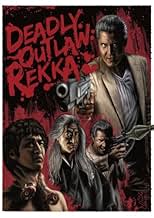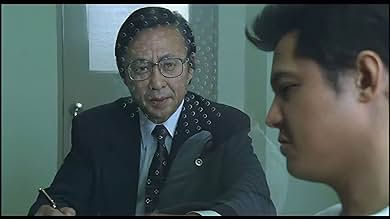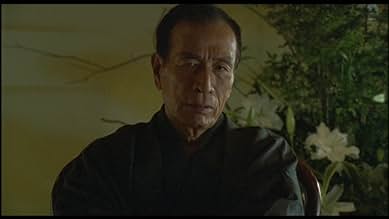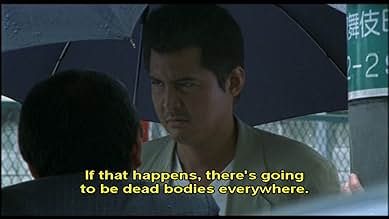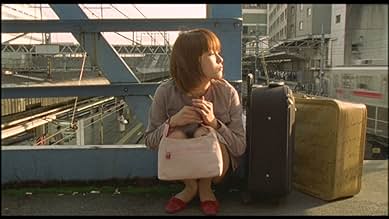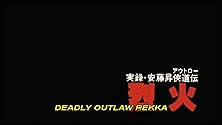Jitsuroku Andô Noboru kyôdô-den: Rekka
- 2002
- 1h 36min
NOTE IMDb
6,7/10
1,8 k
MA NOTE
Ajouter une intrigue dans votre langueWhen his beloved boss is killed, a dangerous young gangster cuts a path of vengeance through the Japanese mafia.When his beloved boss is killed, a dangerous young gangster cuts a path of vengeance through the Japanese mafia.When his beloved boss is killed, a dangerous young gangster cuts a path of vengeance through the Japanese mafia.
- Réalisation
- Scénario
- Casting principal
Avis à la une
Rekka is a movie that deals with the theme of backstabbing and diplomacy of the new Yakuza clashing against the violence and honor of the old Yakuza; a common theme in Miike's under-the-radar gangster movies. It begins when the protagonist's father, the leader of a crime family, is killed. Before he knows what's happening, the new boss of his gang is already making agreements and accepting the murder to avoid a full-scale gang war. Needless to say, the son isn't happy, so he seeks revenge on the rival crime family. Knowing this, the new boss tries to get rid of him so that he can enjoy his new place in the Yakuza hierarchy.
On its own, this is an exciting modern Yakuza thriller filled with bloodshed and intrigue. But if you're already a Miike fan, you might be let down by a few details.
Rekka follows a pretty distinct formula. It has the same plot ideas, nearly the same characters, some of the same actors, and the same filmmakers as Agitator and Kikoku (which came out later). While Miike changes up the style and feel of each one, it still looks like he made three different versions of the same movie. Shigenori Takechi, the screenwriter of all three, has to be the laziest guy in the film industry. You see the same characters doing the same things, only with different names and settings. Like the other movies, the protagonist is a seemingly invincible and honorable guy who just can't seem to get killed no matter what he does. There is a charismatic and equally invincible hit-man chasing him. There are greedy and cowardly superiors that only he can stand up to. There is a dethroned and deceased father figure that he wants to avenge. And of course, there is a love interest that appears for a few minutes combined and has no personality or reason to even be in this movie.
The way that this movie is different is that the feel is a little more intense and modern than the other two. The visuals and camera-work are comparatively better and do a much better job of grabbing your attention. It is not as slow-paced and complicated as Agitator (clearly the best of the three), and it's all-around better than Kikoku (the worst). The ending is the most unique part. For better or worse, it is incredibly strange, and I know that some people will like it. Rekka appears to have the largest budget of the three movie and is the easiest to understand; it's definitely the one to show to your friends.
Like those two other movies, there are no insane shocker moments or incredible gore effects that will stick in your head forever. Rekka has almost nothing in common with Ichi or Fudoh, for example, so new fans of Miike's work might not get what they expect. But it has more than its share of violence, just not enough to make your head spin.
On it's own, Rekka is definitely not a waste of time, and my criticism doesn't sound fair at all. However, the feeling is ruined when you've seen Agitator and/or Kikoku. Seeing these movies after each other in a short span of time left me with a feeling that I got from Graveyard of Honor, another Miike/Takechi product. But in that case, it only took one movie to make me feel uncomfortable by giving me the same message over and over again.
On its own, this is an exciting modern Yakuza thriller filled with bloodshed and intrigue. But if you're already a Miike fan, you might be let down by a few details.
Rekka follows a pretty distinct formula. It has the same plot ideas, nearly the same characters, some of the same actors, and the same filmmakers as Agitator and Kikoku (which came out later). While Miike changes up the style and feel of each one, it still looks like he made three different versions of the same movie. Shigenori Takechi, the screenwriter of all three, has to be the laziest guy in the film industry. You see the same characters doing the same things, only with different names and settings. Like the other movies, the protagonist is a seemingly invincible and honorable guy who just can't seem to get killed no matter what he does. There is a charismatic and equally invincible hit-man chasing him. There are greedy and cowardly superiors that only he can stand up to. There is a dethroned and deceased father figure that he wants to avenge. And of course, there is a love interest that appears for a few minutes combined and has no personality or reason to even be in this movie.
The way that this movie is different is that the feel is a little more intense and modern than the other two. The visuals and camera-work are comparatively better and do a much better job of grabbing your attention. It is not as slow-paced and complicated as Agitator (clearly the best of the three), and it's all-around better than Kikoku (the worst). The ending is the most unique part. For better or worse, it is incredibly strange, and I know that some people will like it. Rekka appears to have the largest budget of the three movie and is the easiest to understand; it's definitely the one to show to your friends.
Like those two other movies, there are no insane shocker moments or incredible gore effects that will stick in your head forever. Rekka has almost nothing in common with Ichi or Fudoh, for example, so new fans of Miike's work might not get what they expect. But it has more than its share of violence, just not enough to make your head spin.
On it's own, Rekka is definitely not a waste of time, and my criticism doesn't sound fair at all. However, the feeling is ruined when you've seen Agitator and/or Kikoku. Seeing these movies after each other in a short span of time left me with a feeling that I got from Graveyard of Honor, another Miike/Takechi product. But in that case, it only took one movie to make me feel uncomfortable by giving me the same message over and over again.
Assassins from the Otaki group murder Yuya Uchida (manager/producer of 1970's psychedelic prog metal band Flower Travellin' Band, who provide the film's soundtrack) leader of the Sanada group. Riki Takeuchi considered him a father figure and wants vengeance, but the leaders of both groups want to avoid a war and enlist Bando group leader Sonny Chiba to negotiate a truce.
So ... it's all a scheme by both groups second-in-commands to eliminate the leaders and take over, with Chiba running the whole show. They trick Takeuchi into killing Otaki group leader Renji Ishibashi and then try to kill him to close all loose ends. Those loose ends stay very much open.
Takashi Miike has a tendency to make films that are so loose and ramshackle that they feel like they may fall apart at any minute. This is one of those. That doesn't mean they're necessarily bad ... and this one certainly isn't ... but it does mean that after a really dynamic opening and before it's amazing gonzo conclusion, you get a lot of meandering scenes of yakuza dumping plot exposition on each other. It's not always dull ... mainly due to Miike's tendency to stage very weird scenes like two yakuza talking outdoors in a playground in the rain each holding tiny transparent plastic umbrellas ... but it frequently is.
The Flower Travellin' Band soundtrack is worth the price of admission.
So ... it's all a scheme by both groups second-in-commands to eliminate the leaders and take over, with Chiba running the whole show. They trick Takeuchi into killing Otaki group leader Renji Ishibashi and then try to kill him to close all loose ends. Those loose ends stay very much open.
Takashi Miike has a tendency to make films that are so loose and ramshackle that they feel like they may fall apart at any minute. This is one of those. That doesn't mean they're necessarily bad ... and this one certainly isn't ... but it does mean that after a really dynamic opening and before it's amazing gonzo conclusion, you get a lot of meandering scenes of yakuza dumping plot exposition on each other. It's not always dull ... mainly due to Miike's tendency to stage very weird scenes like two yakuza talking outdoors in a playground in the rain each holding tiny transparent plastic umbrellas ... but it frequently is.
The Flower Travellin' Band soundtrack is worth the price of admission.
This was really one great ride from Takashi Miike, if you love or you are familliar with his style you will really enjoy Deadly Outlaw:Rekka, it is not intelligent movie, it is not movie with a big budget but it is entertraining and full of energy, and yes the cast in this one is amazing, so many great memorable faces from Japanese cinema, sadly a lot of them are now deceased: Joe Yamanaka, Rikiya Yasuoka, Yuya Uchida, Tetsuro Tanba, Shin'ichi Chiba and the main protagonist of the movie Riki Takeuchi, this is one of his most memorable roles for sure. The first half of the movie is like any other regular Yakuza movie, the second part is more unique cartoonish Miike style, and it works in the movie very well, love the ending when Riki is taking Bazooka to destroy his enemies. You will remember this movie thanks to magnificent cast and its charachters, i enjoyed this one more than more known Dead or Alive. In the same day i have watched Kikoku or Yakuza Demon from 2003, it is different sort of the movie, more regular Yakuza crime, but my recoomendation is to watch it in combination with Deadly Outlaw Rekka. I give this one 8/10.
excerpt, more at my location - A yakuza film is bread and butter for Takashi Miike, and Deadly Outlaw: Rekka (Jitsuroku Andô Noboru kyôdô-den: Rekka), sandwiched between the sadistic violence of Ichi The Killer and the surrealism of Gozu, is surprisingly ordinary when compared with much of the director's oeuvre. However, the straightforward nature of this 2002 film is the essence of its charm.
Deadly Outlaw: Rekka is such unabashed fun it will leave you feeling indulgent and sporting a maniacal grin from start to finish, just like the one, you might imagine subsequent to viewing, Miike wore while making it. Concentrated to an hour-and-a-half, as so few recent films are, it hits you like a shot of pure audio-visual entertainment straight in the arm.
Deadly Outlaw: Rekka is such unabashed fun it will leave you feeling indulgent and sporting a maniacal grin from start to finish, just like the one, you might imagine subsequent to viewing, Miike wore while making it. Concentrated to an hour-and-a-half, as so few recent films are, it hits you like a shot of pure audio-visual entertainment straight in the arm.
Miike shows us in this film his outstanding gift for the yakuza genre from the first minute to the last. This time he adds a soundtrack from the Flower Traveling Band, Satori, a Doom Metal key album from 1971 that makes those master shoots, of perfect color, shine without stopping during the cinematographic experience he proposes.
His characters flow before the viewer like a handful of impossible to stop Japanese scarfaces. Shinjuku, mafia, escorts, magic and Rock and Roll !!
Le saviez-vous
- AnecdotesTakashi Miike cut this movie to the strains of the 1971 progressive rock album "Satori" by the Flower Traveling Band, which he learned of through costars Joe Yamanaka and Yûya Uchida, who were also the band's founding members. Miike found the album to be way ahead of its time and was delighted at how well and inconspicuously it cut into a movie made 30 years later.
- GaffesAt 35:52 the shadow of someone holding a hand-held camera can be seen.
- ConnexionsReferenced in Rewind This! (2013)
Meilleurs choix
Connectez-vous pour évaluer et suivre la liste de favoris afin de recevoir des recommandations personnalisées
Détails
- Date de sortie
- Pays d’origine
- Site officiel
- Langue
- Aussi connu sous le nom de
- Deadly Outlaw: Rekka
- Société de production
- Voir plus de crédits d'entreprise sur IMDbPro
- Durée
- 1h 36min(96 min)
- Couleur
Contribuer à cette page
Suggérer une modification ou ajouter du contenu manquant

